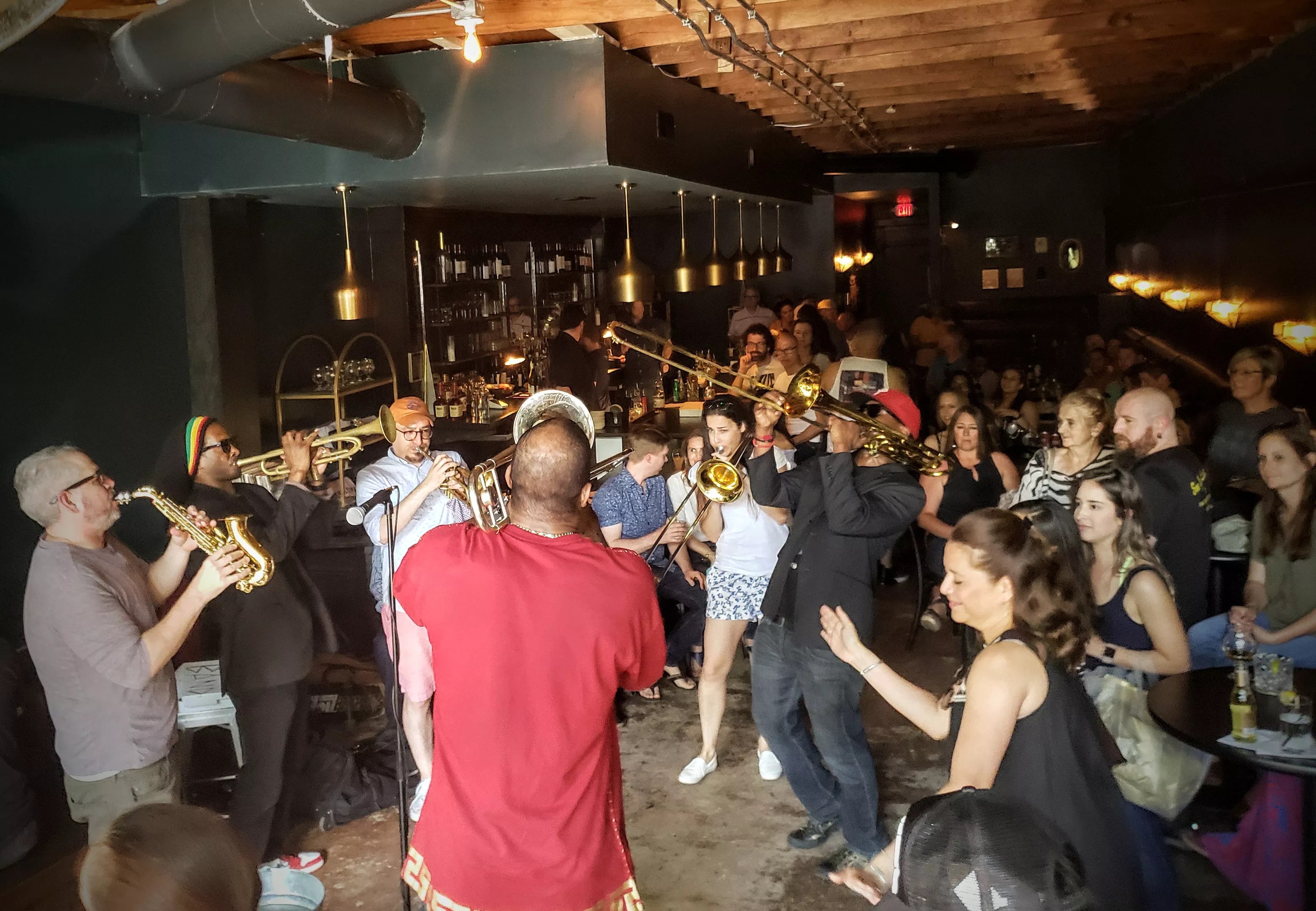
Jason Roberts

Audio By Carbonatix
Mickey Mouse is strolling along, minding his own business, when a scent trail drifts into frame. It fills his nostrils, lifts him into the air and carries him toward whatever it emanates from. It’s an old cartoon gag we’ve all seen.
When I walk through Bishop Arts, the same thing happens to me near Revelers Hall. Instead of a freshly-baked pie, it’s the wail of a trumpet or trombone or the blast of a drum kit hitting my ear that draws me in.
Revelers Hall is a modest spot on North Bishop Avenue, long and narrow. When you enter, there’s a space for the band to play to your left, the bar just beyond them, and seating along the wall to your right. It’s a tight fit, especially when the music is live and the venue is bumping, but that is part of its appeal; it delivers a communal experience for guests because no other experience is possible when you’re sitting cheek-to-jowl, sipping cocktails and listening to jazz.
The city of Dallas is jeopardizing that experience. City code officers are newly enforcing a zoning law that prohibits charging a cover fee (which Revelers Hall does through a $6 music fee added to your tab to pay its musicians) if a venue is classified as a restaurant instead of a “Commercial Amusement (Inside)” establishment. And to what end?
Council member Chad West has said that he is pushing for changes to the code in response to this situation, but progress is rarely swift in the halls of government, and without the income from their cover fee to pay musicians, and without the musicians to bring in customers, it is unclear if Revelers Hall (and other venues like The Free Man) can weather this bureaucratic storm.
Music is key to Revelers Hall and its identity. It has a house band, but also brings in other artists, providing them a stage, a crowd and payment to play. The space is infused with music, echoing with the impact of everyone who has played there over the years.
The city also reportedly informed Revelers Hall that it needed to keep its doors shut at all times, citing potential noise complaints. It’s as if they have never spent an afternoon in Bishop Arts, a neighborhood teeming with activity and, yes, noise. People laugh and talk, ambling from shop to shop; cars putter up and down North Bishop Avenue; street vendors sell their wares in the open air. Silence has never been the draw of Bishop Arts, never been the neighborhood’s primary appeal. It doesn’t even seem attainable. Why is jazz the sound the city finds so offensive in this sonic gumbo?
Dallas-Fort Worth has its share of jazz clubs, and some of them are quite good. Windmills in The Colony, The Balcony Club in Dallas and others all do their part to keep the genre alive in our community. But even among its peers, there is something special about Revelers Hall, located in a highly walkable and visited neighborhood. Some jazz clubs are designed, rather intentionally, to be an escape from the world; Revelers Hall proudly welcomes the world to join it in song, with its doors thrown open and music spilling out into the streets. Even if you don’t have time to stick around for the entire show, sometimes it is nice to pause outside when a band is playing at the club to catch a few bars before you head to your next destination.
Jazz is one of the great American artforms. It was born in New Orleans, a permutation of many musical styles and traditions from around the world. In turn, it has influenced the genres that came after it to a significant degree. Hip-hop, rock and roll and pop music owe a great debt to jazz; many artists working in these genres proudly proclaim its influence on their music.
What sets jazz apart from other genres is its sense of freedom and improvisation. The best jazz players feed off the energy of the crowd when they perform, taking the melody for a walk, slipping prime position on a song and then passing the baton to one of their colleagues. They experiment, changing the delivery of individual notes, expanding sections of time-honored classics, making every performance unique, fresh and exciting. Only hip-hop can compare in terms of flexibility and experimentation.
If anything, we should demand more of this in our streets, not less. People are insulated and walled off from one another by politics, technology and class. Music transcends these divides, and having a quality jazz club introducing people to the form in a public space, sharing its sounds with passersby, is something to celebrate.
Someone should let the city government know.